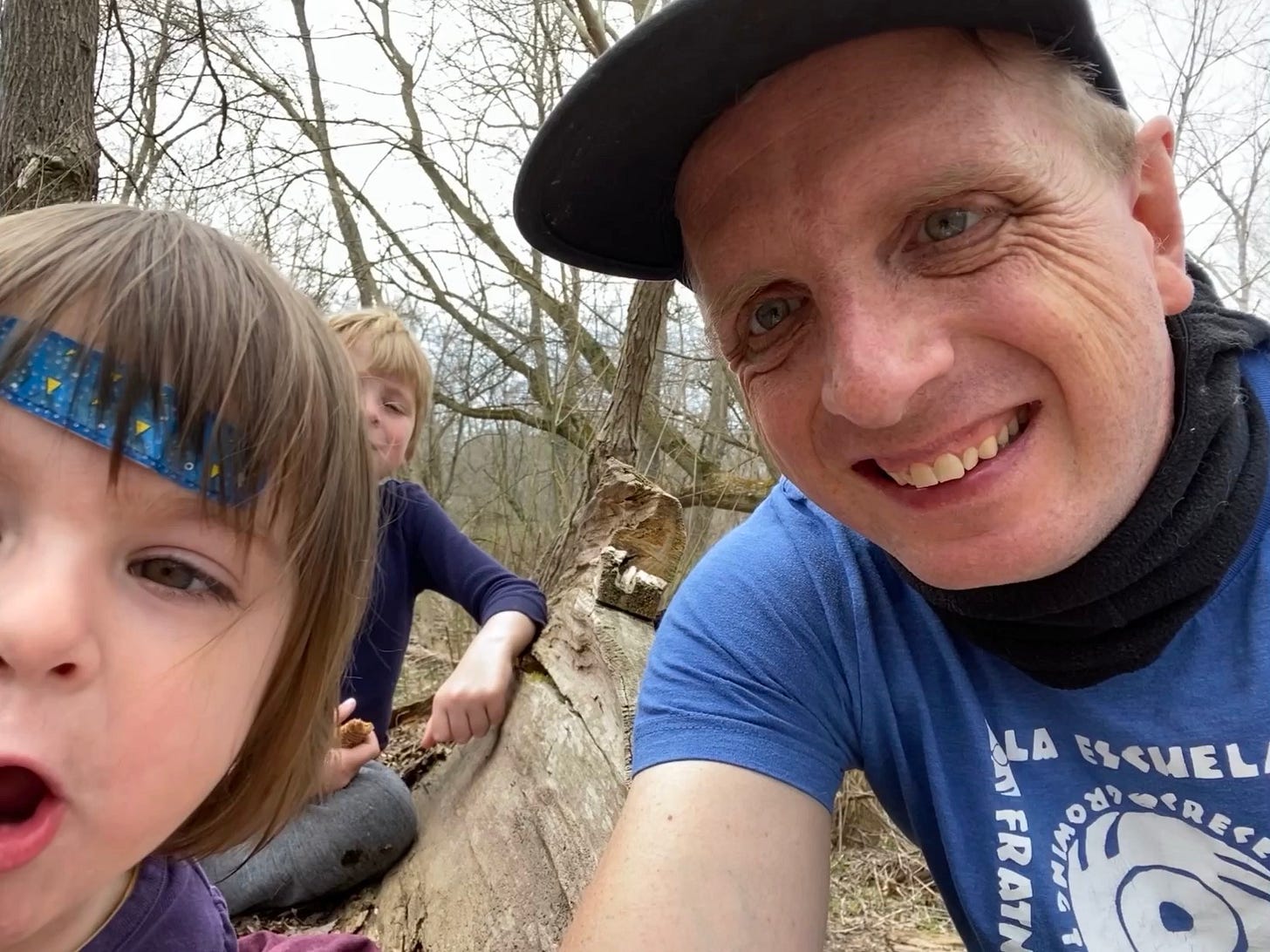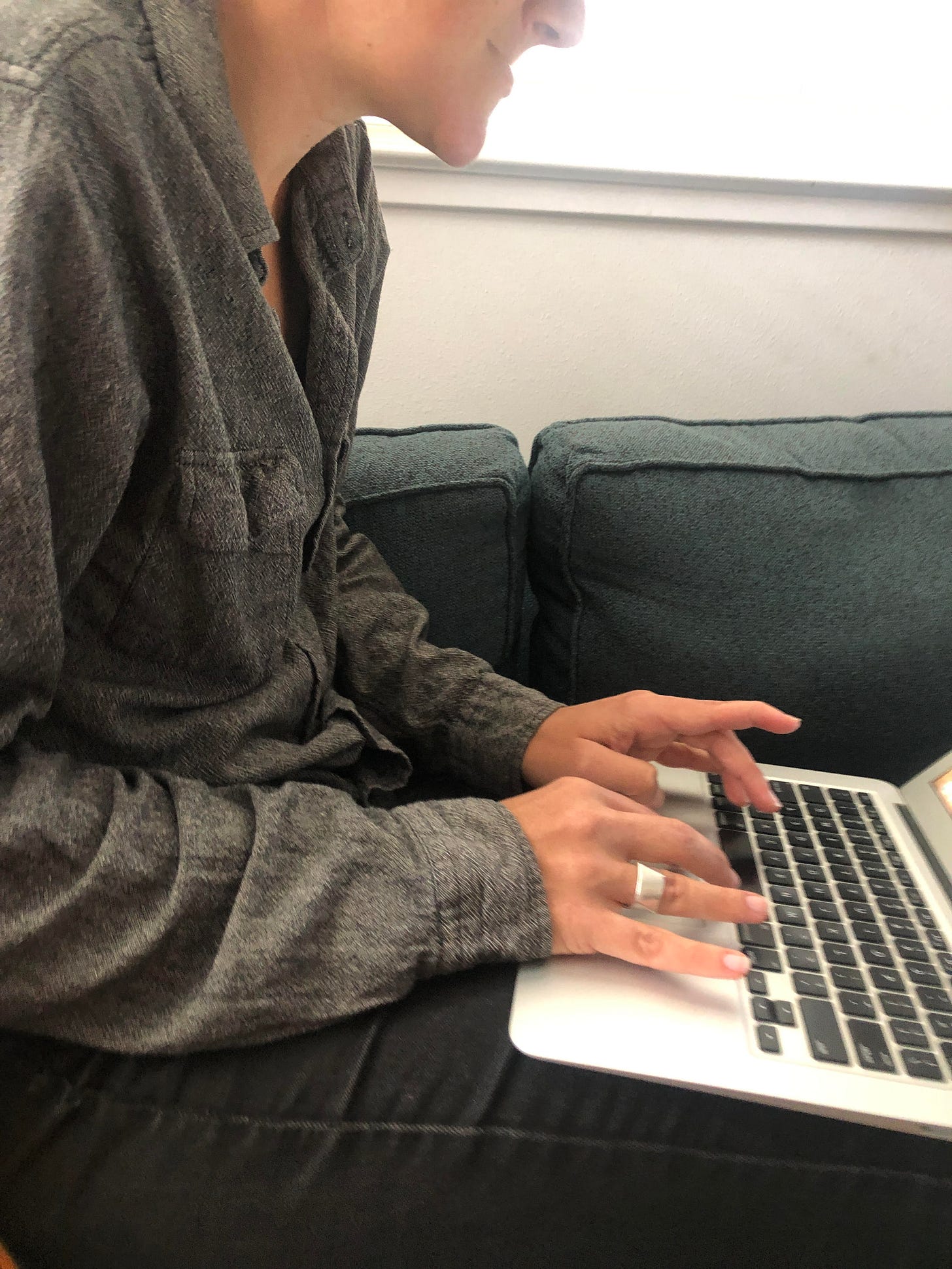Frienemies of the Pods
A correspondence on the equity implications of corona-era privatization
Sometimes weird shit happen, like a science fiction-sounding pandemic actually changes the whole world overnight or a surprisingly large sector of “colorblind” Americans start using the words “white supremacy.” Sometimes one friend dies, and your heart is broken in a place that will never quite be mended, but also you meet a new friend because of it.
One of the most meaningful things that has come out of losing my friend Courtney Myktyn is that I read some words which a stranger named Garrett Bucks—some white dad in Milwaukee?!—wrote about her and was completely blown away by his tenderness and eloquence. I’ve been following him ever since (you should, too) trying to figure out who the heck he is and how he can be so wise and self-deprecating and funny all at once. And now we are friends who write each other letters when we are sad and confused. Here’s just such an exchange (starting with a letter to me from Garrett) in case it helps you think through this moment of global crisis, profoundly dispiriting distance learning, and elite parent scheming...

Hey friend,
How are you? I'm feeling super weird. And confused. And mad, I think?
Here’s how my past week went: I’m facilitating these anti-racist organizing trainings for white people. They’ve been incredible. And we’re immersing ourselves in reflections from rad organizers-- Mariame Kaba, Jane Mcalevey, Joanie Mayer. Their through-line, which I’m sure won’t surprise you, is that organizing isn’t about charismatic persuasion, it’s about truly believing in and rooting for the people with whom you're working. Radical curiosity instead of self-righteousness. And so we’re sitting with that and imagining what it looks like to really believe that ourselves and other white people can become less addicted to white supremacy. And Courtney, it’s just next level inspiring. So I’m on this high, right?
And then... Ugh. Ugh. Ugh. I start hearing about the pods. I’m obviously late to the game on all this, but apparently a not-insignificant number of white privileged parents have decided that the best response to the impossible choice their school districts are in this fall is to squad up and hire a private tutor for their kids? Like, really? And on top of that there are all these private schools doing the absolute most? And by “absolute most” I mean that a toney school in Connecticut apparently has acquired access to a FREAKING CASTLE so as to better spread out their students?
Would it surprise you that Milwaukee Public Schools has no current castle-related plans for our cit’'s kids?
I’m not quite sure why this moment hit me so hard, why I just wanted to scream last night. My best bet is that, unlike BIPOC activists (who’ve long known to keep a healthy skepticism about any burst of newfound white anti-racist energy) I’m still a total rube. I really wanted to believe that all the anti-racist book clubs and Black Lives Matter signs in yards (not to mention a COVID-era understanding of our intereconnectedness) might mean that, this time, so many white parents’ instinct wouldn’t be to run back into the warm embrace of individualism and opportunity hoarding. And I’m sure there are many white folks trying to lean into a new way of being right now. Buttttt overall... it’s not looking good out there!
So, I’m confused. I’m really trying to practice what I preach here. I know this is a moment where approaching other white parents with empathy and curiosity would be particularly fruitful -- holy hell, Courtney, I get that we’re all balancing impossible choices! I get the exhaustion, and the fear and the desire to have your kid get to goof around with other little human beings in a non-zoom setting. I SHOULD be able to lean into that instinct in order to connect with other white parents, to struggle together, to not just be a self-righteous jerk. But it feels like if I tried to open my mouth to ask a question, the only thing that would come out is a scream.
Are you feeling any of this? How does this look from Oakland? And, for real, how are you doing?
-Garrett

Hey friend,
Oh man, I feel you. So far, Oakland Unified School District not only doesn’t have a magical COVID-free castle, but we don’t have enough PPE for our teachers. I’ve had a few friends reach out about our interest in joining pods complete with private tutors, and I felt my body--depleted from all these months--sort of swoon with the sound of it all. I’m so tired, Garrett. The Google calendar tetris late at night with my dude (not sexy at all, just in case that sounds like a euphemism for something...the opposite of sexy), playing “wild animal rescue” with my 3-year-old every damn day, and the guilt I feel over letting my 6-year-old listen to The Secret Garden on audiobook, well, maybe like 17 times (it’s 9 hours long)...well, let’s just say, it’s not bringing out the freshest, most vital version of little old me.
Which is all to say, I actually really, really get the wanting to pod up and pay someone to make it all go away thing. This is what underfunded, inept public systems do to white and privileged people. They underwhelm us. (We’re used to being marketed to and “served.”) They exhaust us. (Who's on first? Where is the manager of this public school system?) Eventually, they repel us altogether. So we buy our way out of them. We buy our way out of the exhaustion and the dysfunction and the complexity. And we rationalize it because we are, in fact, tired.
Or, truth be told, we don't rationalize it at all, because we don't even realize we need to. We think our choices are disconnected from the system as a whole. We don’t know any working class parents of color so how would we know they aren’t creating the exact same kind of pods and hiring frustrated Princeton graduates to run them like little mini-charter school experiments?
It actually reminds me of my dad. When he finally retired from a million years in a law firm (he was a bankruptcy lawyer) and negotiated the world for the first time without a secretary, he used to regularly come home and express pure shock and terror at how dysfunctional some places were--the post office, for example. He would tell us what happened to him--long lines, lost packages, rude postal workers--as if he was the first human on earth to experience such treatment, as if we might, at that very moment, have a breaking news story on our hands that we needed to get out immediately so as to save other retired lawyers from the same inefficient fate.
My mom and I enjoyed laughing at (with?) him during those months when he met bureaucracy and dysfunction for the first time. But there was a darker truth there--patriarchy and the class mobility he enjoyed (moving from being a kid who answered the door for debt collectors and lied about his parents being gone) had cushioned him from a powerful source of outrage.
That outrage, when understood to be a collective experience, not an individual customer service problem, can foment into solidarity. Which becomes social movements.
Which brings me back to your critical work getting white people together and studying these great organizers (none of whom I knew about! I’ll be doing something about that while I let Maya listen to The Secret Garden for the 18th time!). Capitalism and white supremacy have made white people, especially white parents, dumb about systems, about slowness, about solidarity. Some of us talk a big game about our progressive values, but we often still think about them in consumeristic terms. We consume the things that we think make us anti-racist--the webinars and the lawn signs, but we don’t think as much about the world of things that we could choose not to consume. Like pods and private tutors. We aren’t socialized to see our “personal” choices--where we buy our home and how we live there, where we send our kid to school and how we show up--as feeding or starving the whole unequal system which we feel edgy discussing in our zoom book clubs.
And maybe that is edgy for some! Depending on who they are. And this, Garrett, is where we have to take a deep breath and welcome our white brethren in. Some of them are going to drop their kids off at castles, others are going to perfect their pods, and still others, like you and me, are going to figure out some half-assed way of staying sort of above water that we hope aligns with our values more squarely. (What are you going to do?! We're sending our 3-year-old back to her tiny, home-based preschool and have convinced the family who runs it to also take our 6-year-old a few afternoons a week so she can hang out with their granddaughter, who is about the same age.)
John Lewis, RIP, would say that we can’t give up on anyone. If BIPOC are cynical about white people, Lord knows they’ve earned the shit out of that cynicism. You and me, well, we haven’t earned shit just yet. Other than this nice friendship across all these miles, and these honest words about what we’re trying to do and how it’s sometimes hopeful and sometimes really dispiriting. I think we can draw a big bright line between the pods and the public school system, which basically has a dozen pre-existing conditions and is gasping on a ventilator right now. The more of us that draw the line, not righteously but in a plain spoken, kind-hearted way, the more white people will see it.
Garrett, you should be hopeful about the organizing work. That is real, too. And so is white people's addiction to supremacy and self-preservation and privatization. It’s all true at once.
Love C.
Head on over to Garrett’s Substack to read the next and last two installments of the exchange.




Thanks for this conservation, and the conversations it will spark. You are both so humble and relentless in your work, it's a lovely combination.
This is going to sound off point, but it truly isn't: here's the thing: your 6-year old's audiobook listening is maybe going to serve her as well if not better than subpar remote instruction. I could list for you the reading-related skills she's building, but trust me that you should feel GREAT about that. There are lots of things that parents are juggling right now, not the least of which is just plain old care for kids to allow for adult lives to go on. But in terms of the guilt around educating our youngest, I wish schools would go further to make sure parents understood what kids actually need -- to build reading skills especially. How can families make decisions when the goals are misunderstood?